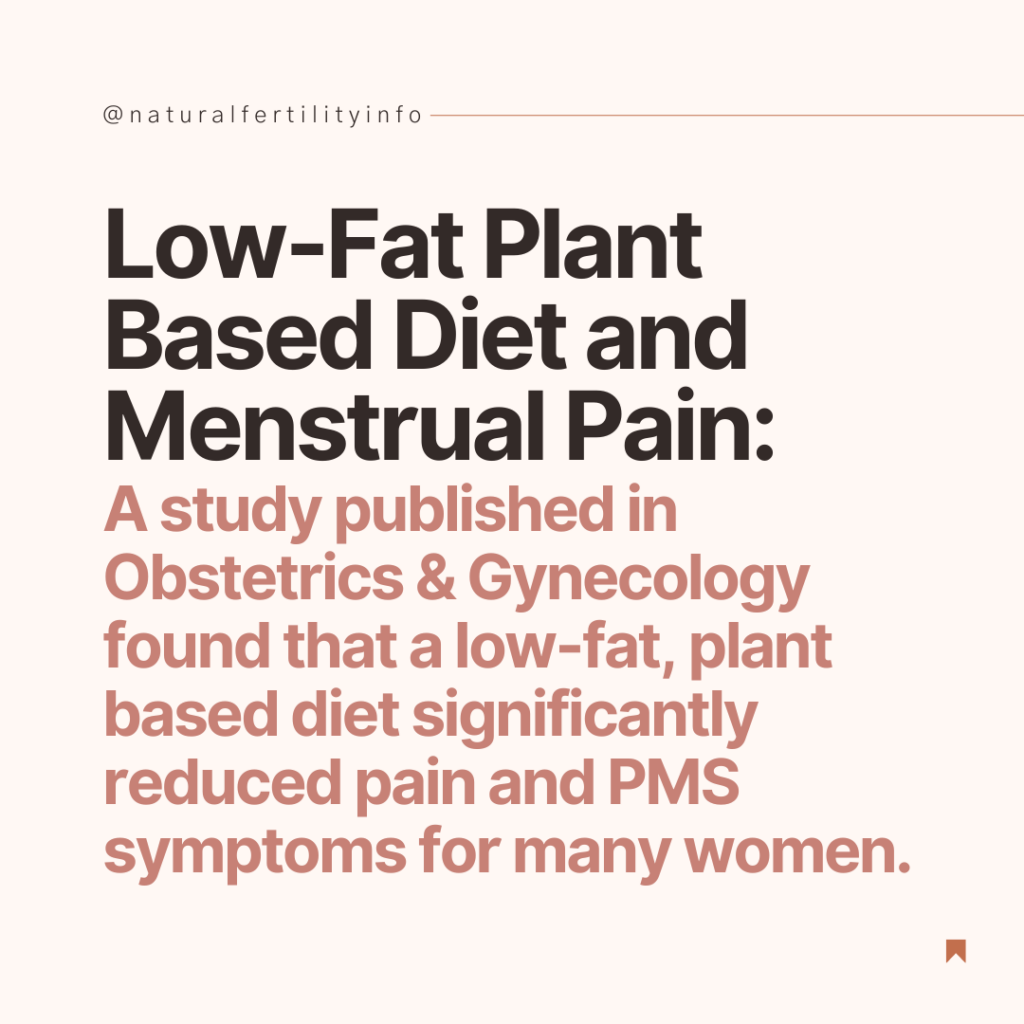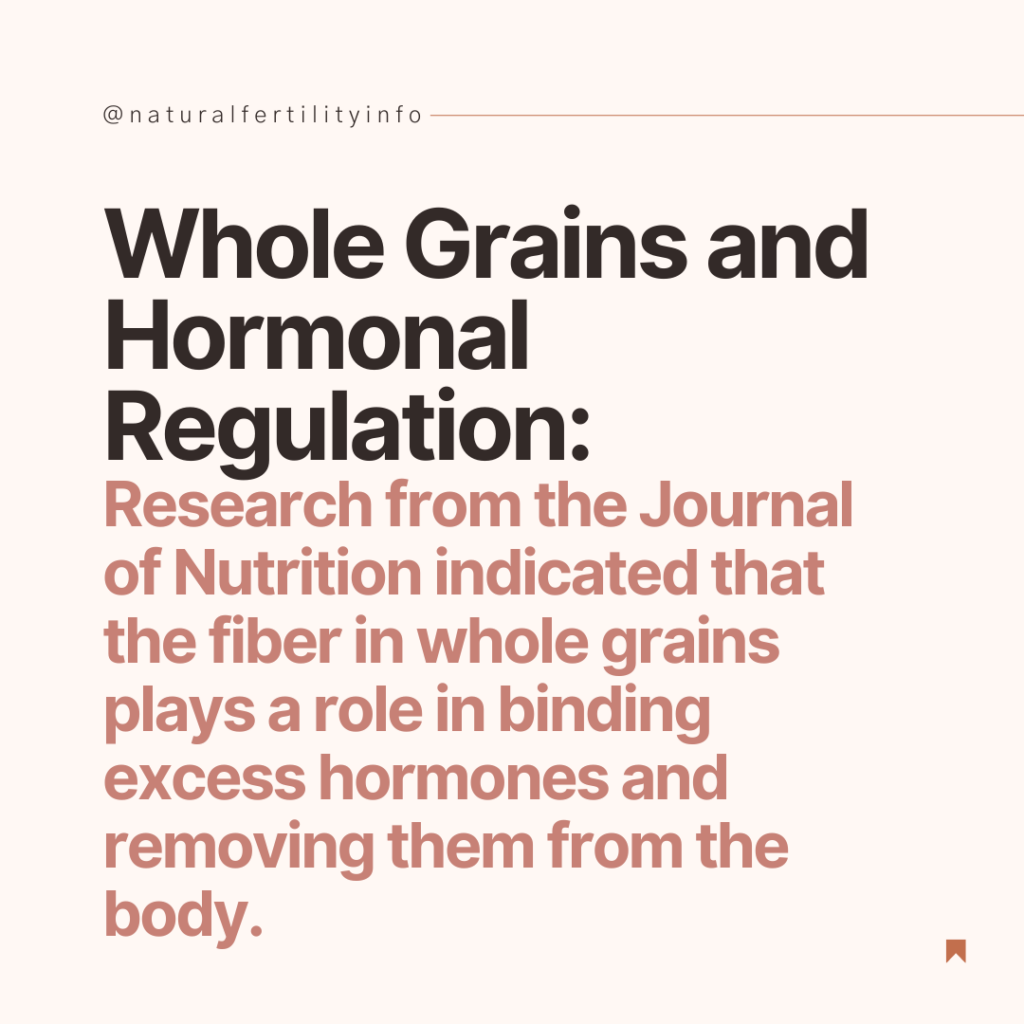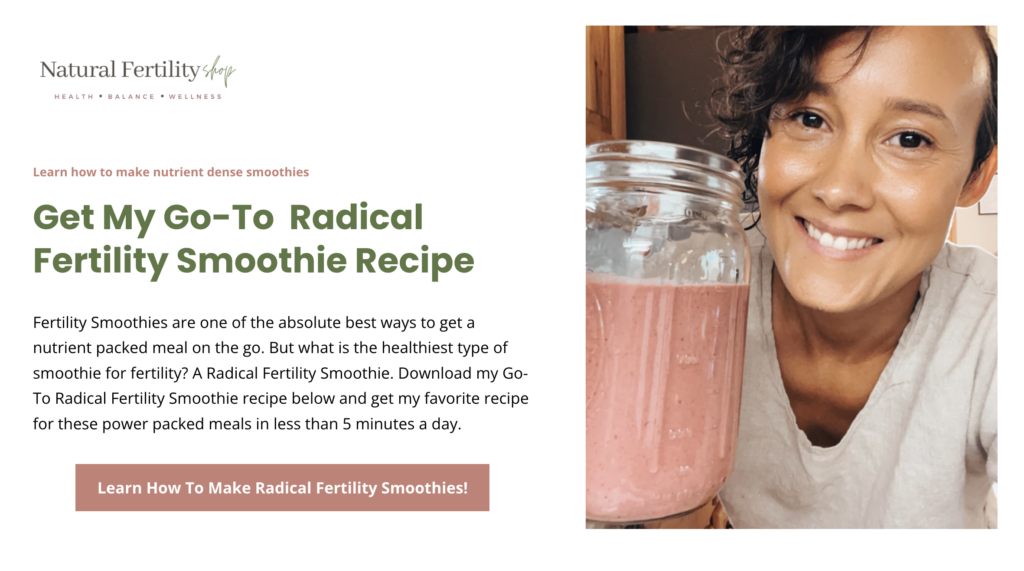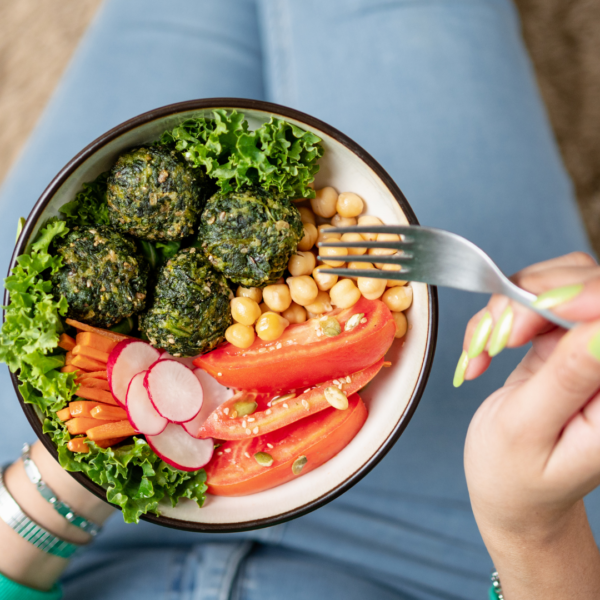If you’re navigating the journey of reproductive health or trying to conceive, you might have heard about the potential benefits of a plant-based diet for improving menstrual health. It’s a topic that’s gaining traction, and for good reason.
Today, we’re going to delve into how a plant-based diet can be a powerful ally for healthier periods and overall reproductive wellness.

Benefits of Plant-Based Eating For Women
Transitioning to a plant-based diet can offer numerous benefits for women, particularly in relation to menstrual health and hormone balance. A diet rich in whole, unprocessed plant foods provides an abundance of nutrients that can be particularly beneficial for women’s reproductive health.
Here are some of the main benefits of eating a plant based diet:
Fiber
Fiber plays a crucial role in hormone regulation by aiding in the elimination of excess hormones, such as estrogen, from the body. High-fiber foods, such as fruits, vegetables, legumes, and whole grains, can help maintain a healthy digestive system and promote colon health.
The regular consumption of fiber-rich foods is associated with a reduced risk of developing conditions like endometriosis and may alleviate symptoms of PMS and menstrual pain.
Antioxidants
Antioxidants found in plant-based foods, such as vitamins C and E, flavonoids, and other phytochemicals, can protect the body’s cells from damage caused by free radicals. These nutrients are essential for maintaining overall health and can be particularly protective against oxidative stress, which has been linked to reproductive and egg health issues.
Protective Effects
A diet high in plant-based foods can be protective against various health conditions. For example, the consumption of cruciferous vegetables has been linked to modulated estrogen metabolism, which may reduce the risk of estrogen-related conditions.
Avoiding Excess Hormones
Plant-based diets can help women avoid the intake of excess hormones found in high-fat animal products. These hormones can disrupt the body’s natural hormonal balance and contribute to conditions like endometriosis.
Phytoestrogens
Phytoestrogens are plant-derived compounds that can mimic the action of estrogen in the body. They are found in foods like soy, flaxseeds, and sesame seeds. Phytoestrogens may offer health benefits, such as reducing menopausal symptoms and potentially protecting against certain types of cancer.
Detoxifying Effects
A plant-based diet can support the body’s natural detoxification processes. By emphasizing the intake of whole foods and minimizing processed foods, a plant-based diet can help reduce the body’s toxin load and support the organs involved in detoxification
Colon Health
A diet rich in plant-based foods supports colon health by providing ample dietary fiber, which is essential for regular bowel movements and the prevention of digestive disorders. This is also an important factor for healthy thyroid levels and estrogen balance.
Studies That Highlight The Benefits Of A Plant-Based Diet and Menstrual Health

Low-Fat Plant Based Diet and Menstrual Pain: A study published in Obstetrics & Gynecology found that a low-fat, plant based diet significantly reduced pain and PMS symptoms for many women.
Cruciferous Vegetables and Hormonal Balance: Research in the Journal of Nutrition highlighted that cruciferous vegetables could modulate estrogen metabolism, potentially reducing the risk of estrogen-related conditions.
Iron Intake in Plant-Based Diets: The American Journal of Clinical Nutrition reported that vegetarians who consume a variety of plant foods are not at any greater risk of iron deficiency than non-vegetarians.
Omega-3 Fatty Acids and Menstrual Pain: A study in the Journal of Reproductive Health suggested that omega-3 supplementation could lessen menstrual pain.
Whole Grains and Hormonal Regulation: Research from the Journal of Nutrition indicated that the fiber in whole grains plays a role in binding excess hormones and removing them from the body.
Dietary Phytoestrogens and Hormones: A comprehensive review in Nutrients discussed the effects of dietary phytoestrogens on hormones throughout different stages of life, highlighting their potential impact on menstrual health.
Vegetarian Diet and Uterine Fibroids: A case-control study published by PubMed investigated the correlation between a vegetarian diet and a reduced risk of uterine fibroids, finding significant associations with the consumption of specific vegetables and fruits.
Plant-Based Diets and Estrogen Levels: Research in Healthline discussed how plant-based diets, being high in fiber and certain phytoestrogens, might help promote healthy estrogen levels and protect against hormone-sensitive conditions.

Impact of Vegan Diet on Menstrual Cycle: An article in The Vegan Review explored anecdotal evidence suggesting that a vegan diet might result in lighter and less painful periods due to lower inflammation levels.
Plant Foods to Embrace
Cruciferous Vegetables
Cruciferous vegetables like broccoli, kale, and cauliflower are not only nutrient-dense but also contain compounds such as indole-3-carbinol, which has been shown to support hormonal balance and may alleviate period pain.
A study in the Journal of Nutrition highlighted that these vegetables could modulate estrogen metabolism, potentially reducing the risk of estrogen-related conditions.
Iron-Rich Foods
Leafy greens and legumes are pivotal for replenishing iron lost during menstruation, especially important for those experiencing heavy bleeding. The non-heme iron found in plant foods, while not as readily absorbed as heme iron from animal products, can still significantly contribute to iron levels when consumed with vitamin C-rich foods to enhance absorption.
The American Journal of Clinical Nutrition reported that vegetarians who consume a variety of plant foods are not at any greater risk of iron deficiency than non-vegetarians.
It’s a myth that plant-based diets cannot provide enough iron; foods like lentils, chickpeas, and spinach are excellent sources.
Omega-3 Fatty Acids
Omega-3 fatty acids, found in flaxseeds and walnuts, are known for their anti-inflammatory properties, which can reduce menstrual cramps. A study in the Journal of Reproductive Health suggested that omega-3 supplementation could lessen menstrual pain. Incorporating these into a plant-based diet can offer a natural approach to managing period discomfort.
Whole Grains
Quinoa, brown rice, and oats are not only filling but also provide B vitamins and fiber, aiding in digestion and hormonal regulation. Whole grains can help stabilize blood sugar levels, which is crucial for maintaining hormonal balance.
The fiber in whole grains also plays a role in binding excess hormones and removing them from the body, as indicated in research from the Journal of Nutrition.

Foods to Reduce or Eliminate
When considering a plant-based diet for healthier menstrual cycles, it’s crucial to understand not just what to include, but also what foods might be detrimental to reproductive health.
Two categories of foods that are particularly important to reduce or eliminate are high-fat animal products and refined sugars and processed foods. These food groups can have profound effects on hormonal balance, inflammation, and overall menstrual health.
High-Fat Animal Products and Hormonal Health
High-fat animal products, such as certain cuts of beef, pork, and dairy products, can have a significant impact on estrogen levels in the body.
A study published in Obstetrics & Gynecology found that women consuming more than two servings per day of red meat had a 56% higher risk of developing endometriosis, a condition characterized by the growth of uterine tissue outside the uterus, which can lead to painful periods.
This association was particularly strong for non-processed red meats. Additionally, pork consumption has been linked to an increased risk of endometriosis, with women who ate ham three or more times a week being 80% more likely to develop the condition.
One reason for these effects may be the presence of naturally occurring hormones in animal products. Both progesterone and estrogens are lipid-soluble hormones found in animal fats.
Consuming high-fat animal products can introduce these hormones into the body, potentially disrupting the natural hormonal balance and leading to conditions like endometriosis. Lower-fat versions of these foods contain reduced levels of these hormones, suggesting that the fat content may play a role in their hormonal impact.
Refined Sugars, Processed Foods, and Insulin Levels
Refined sugars and processed foods can exacerbate inflammation and lead to hormonal imbalances, significantly affecting menstrual health. Consuming foods high in refined sugars contributes to blood sugar spikes, which in turn can lead to insulin resistance.
Insulin is a hormone that regulates blood sugar levels, and insulin resistance can disrupt this balance, affecting the body’s ability to use sugar for energy efficiently. This condition is associated with increased risk of conditions like polycystic ovary syndrome (PCOS), which can cause irregular periods and infertility.
Processed foods often contain high levels of sugars, as well as unhealthy fats and additives that can further contribute to inflammation and hormonal imbalances. These foods can disrupt the gut microbiome, leading to increased gut permeability and systemic inflammation, which can exacerbate menstrual pain and irregularities.
For individuals looking to support their reproductive health through diet, reducing or eliminating high-fat animal products and refined sugars and processed foods is a key strategy.
By focusing on whole, plant-based foods and minimizing intake of foods that can disrupt hormonal balance and increase inflammation, it’s possible to support healthier menstrual cycles and overall reproductive health.
Debunking Plant-Based Diet Myths
When it comes to plant-based diets, there are several myths that persist, causing unnecessary concern. Let’s address these myths with facts and provide guidance on how to ensure adequate protein intake and manage costs effectively on a plant-based diet. Also note that one doesn’t have to be 100% plant based to gain the benefits.
Myth: You Won’t Get Enough Protein on a Plant-Based Diet
Truth: Plant-based diets can provide all the essential amino acids your body needs.
Amino acids are the building blocks of protein, and while it’s true that animal proteins contain all nine essential amino acids, so do many plant-based foods. For example, soy products like tofu, tempeh, and edamame are complete proteins, meaning they contain all nine essential amino acids in sufficient amounts.
Other plant foods may be lower in one or more essential amino acids, but by eating a variety of plant-based protein sources throughout the day, you can easily obtain a full complement of amino acids without ever having to think about it.
To determine how much protein you need in a day, you can use the recommended dietary allowance (RDA), which is 0.8 grams of protein per kilogram of body weight for the average adult.
Based on this formula, a woman weighing 130 lbs should aim to consume approximately 47 grams of protein per day to meet the average adult requirement of 0.8 grams of protein per kilogram of body weight.
For those who are more active, pregnant, or breastfeeding, protein needs may be higher.
It’s quite easy to meet or even exceed your daily protein needs on a plant-based diet by including foods such as lentils, chickpeas, peanuts, almonds, quinoa, and whole grains. These foods are not only rich in protein but also in other nutrients that support overall health.
Myth: Soybeans Are Bad For Fertility
Truth: Concerns about soybeans and fertility are often based on misunderstandings about phytoestrogens, which are plant compounds that can bind to estrogen receptors in the body.
However, research indicates that moderate consumption of soy does not affect female fertility and is safe for women trying to conceive.
In men, clinical studies have shown that neither soy foods nor isoflavones adversely affect sperm or semen parameters, even in amounts exceeding typical Japanese intake.
Furthermore, a meta-analysis concluded that soy intake does not affect male reproductive hormones. Therefore, soybeans, when consumed in moderation, do not pose a risk to fertility and can be part of a healthy diet.
Myth: Phytoestrogens Will Increase Estrogen in Your Body and Should Be Avoided
Truth: Phytoestrogens, such as those found in soy, do not always mimic estrogen. In some cases, they may block the action of estrogen.
Phytoestrogens have both weak estrogenic and anti-estrogenic properties, meaning they can act like estrogen in some tissues while blocking estrogen in others.
Studies have shown that phytoestrogens can be beneficial, offering relief from menopausal symptoms, and may even have protective effects against certain types of cancer.
The overall evidence suggests that phytoestrogens do not disrupt endocrine function and are not associated with adverse health outcomes.
Myth: Plant-Based Diets Are Expensive and Restrictive
Truth: Plant-based diets can be incredibly economical.
Vegetables, grains, and legumes are often less expensive than meat, especially when considering the cost per serving. Whole foods like beans, lentils, rice, and seasonal vegetables can be purchased in bulk and are staple ingredients in many affordable and nutritious plant-based meals.
Cooking with whole foods is generally less expensive than eating out, relying on fast food, or purchasing animal products. Additionally, plant-based diets are far from restrictive; they offer a wide array of flavors and textures, and with the growing availability of plant-based options, there’s more variety than ever before.
Myth: Plant-Based Diets Are Not Convenient
Truth: Plant-based meals can be just as convenient as any other diet.
Smoothies, salads, rice, and vegetable dishes can be quick to prepare, especially with a little planning. Batch cooking grains and legumes at the start of the week can save time, and many plant-based foods require minimal cooking. For example, a smoothie can be made in minutes and is a nutritious option for breakfast or a snack. Salads can be prepped ahead of time, and simple stir-fries with rice and vegetables can be a quick dinner solution.
The convenience of plant-based eating is enhanced by the fact that many plant foods can be eaten raw or require less cooking time than animal products.
In summary, plant-based diets can provide all the necessary protein through a variety of delicious, affordable, and convenient foods. By incorporating a range of plant-based proteins into your diet and taking advantage of the cost savings associated with whole foods, you can enjoy a nutritious, satisfying, and easy-to-prepare plant-based diet.
Getting Started with a Plant-Based Diet
Transitioning to a plant-based diet doesn’t have to be overwhelming. With a strategic approach and a bit of creativity, you can make the shift smoothly and enjoyably. Here’s a step-by-step guide to help you begin your journey towards a healthier, plant-based lifestyle:
Start Slow
Introduce plant-based meals gradually into your diet. A great way to start is by implementing Meatless Mondays, where you dedicate one day a week to eating only plant-based meals. This can help you ease into the diet change without feeling overwhelmed. Experiment with different recipes and flavors to find what you enjoy most.
Plan Your Meals
Planning is key to a successful transition. Focus on incorporating a variety of foods to ensure you’re getting a wide range of nutrients. Plan your meals around whole grains, legumes, nuts, seeds, and plenty of fruits and vegetables. This diversity not only helps with nutritional balance but also keeps meals interesting and flavorful.
Listen to Your Body
As you incorporate more plant-based foods into your diet, pay close attention to how your body responds, especially in relation to your menstrual health. Some people might find certain foods particularly beneficial, while others might not suit them as well. Adjust your diet based on your body’s signals to find what works best for you.
Find Your Go-To Meals
A practical tip for easing into a plant-based diet is to start with your current favorite meals and find ways to create plant-based versions of them. For example, if you love spaghetti bolognese, try substituting the ground meat with lentils or a plant-based mince. Adding vegetables like cauliflower to almost any dish is an easy way to increase its plant content. Cauliflower can be riced, mashed, or used as a meat substitute because of its versatile texture and mild flavor.
Three Plant-Based Meals to Start With
Here are three simple, nutritious plant-based meals that are perfect for beginners:
Radical Fertility Smoothies
Start your day with a nutrient-packed fertility smoothie. Combine leafy greens like spinach or kale with a base of almond or soy milk, add a banana for sweetness, and a tablespoon of flaxseeds for omega-3 fatty acids. You can also include a scoop of plant-based protein powder to boost your protein intake.

Salad Meals
Create hearty salads that serve as complete meals. Begin with a base of mixed greens, add various chopped vegetables, a good protein source like chickpeas or tofu, and top with seeds or nuts for extra texture. Dress with a simple vinaigrette or a tahini lemon dressing. Salads are versatile, and you can mix and match ingredients based on what’s in season and your personal preferences.
Easy Stir-Fry with Rice
Stir-fries are quick to prepare and can be packed with nutrients. Use a variety of colorful vegetables such as bell peppers, broccoli, and snap peas. Add tofu or tempeh for protein, and stir-fry with a splash of soy sauce, garlic, and ginger. Serve over a bed of brown rice or quinoa for a fulfilling and balanced meal.
By starting with these simple steps and meals, you can gradually build your confidence and familiarity with plant-based cooking, leading to a more sustainable and health-supportive diet.
You Can Do It!!
Embracing a plant-based diet can be a delightful journey of discovery, filled with delicious foods that not only tantalize your taste buds but also contribute to a healthier menstrual cycle. Remember, it’s not about perfection but about making choices that support your body’s natural rhythms and reproductive health.
So, why not give it a try and see how your body responds? Your periods might just thank you for it!





